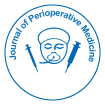
Journal of Perioperative Medicine
Open Access
ISSN: 2684-1290

ISSN: 2684-1290
Perspective - (2024)Volume 7, Issue 2
Organ transplantation stands as one of the most remarkable achievements in modern medicine, offering a new lease on life to individuals suffering from end-stage organ failure. However, the success of such complex surgical procedures relies not only on the expertise of surgeons but also on the meticulous orchestration of perioperative care, where anesthesia plays a pivotal role. In the realm of critical care in organ transplantation, the impact of anesthesia cannot be overstated.
Anesthesia serves as the essential of perioperative management in organ transplantation, encompassing preoperative assessment, intraoperative management, and postoperative care. Its significance lies not only in providing sedation and analgesia but also in optimizing hemodynamic stability, ensuring adequate organ perfusion, and mitigating the risk of complications throughout the transplantation process.
In the preoperative phase, anesthesia plays a important role in assessing patients' suitability for transplantation and optimizing their medical condition to minimize perioperative risks. Patients with end-stage organ failure often present with multiple comorbidities and physiological derangements, necessitating thorough preoperative evaluation and optimization. Anesthesia specialists collaborate closely with other members of the multidisciplinary transplant team to significant perioperative management strategies to the individual patient's needs, ensuring optimal outcomes.
During the intraoperative phase, anesthesia's impact extends beyond merely maintaining unconsciousness and pain control. Anesthesiologists are responsible for maintaining hemodynamic stability, achieving adequate fluid balance, and optimizing tissue oxygenation to support organ viability throughout the surgical procedure. In organ transplantation, where the surgical insult and hemodynamic fluctuations are particularly pronounced, meticulous intraoperative management is essential to minimize ischemia-reperfusion injury and ensure successful graft function.
Anesthesia techniques in organ transplantation have evolved significantly over the years, with advancements such as goaldirected fluid therapy, enhanced monitoring modalities, and refined pharmacological agents contributing to improved perioperative outcomes. Significant anesthesia management to the specific requirements of each transplant procedure, whether it be heart, lung, liver, kidney, or pancreas transplantation, is essential to optimize patient outcomes and graft survival.
In the postoperative phase, anesthesia continues to play a vital role in intensive care management, particularly in the immediate post-transplant period when patients are most vulnerable to complications. Close monitoring of hemodynamic parameters, respiratory function, and fluid balance allows early detection and intervention for potential complications, such as graft rejection, infection, or hemodynamic instability. Anesthesia-led critical care teams provide seamless continuity of care from the operating room to the intensive care unit, ensuring a smooth transition and comprehensive management of post-transplant complications.
Beyond its immediate perioperative impact, anesthesia also contributes to long-term outcomes in organ transplantation by optimizing immunomodulation and minimizing the risk of perioperative complications that may impact graft survival. Strategies such as preemptive pain management, avoidance of intraoperative hypotension, and judicious fluid administration have been shown to influence long-term graft function and patient survival, highlighting the enduring significance of anesthesia in the transplant journey.
Despite the advances in perioperative management, challenges remain in optimizing critical care in organ transplantation. The scarcity of donor organs, the complexity of recipient selection, and the intricacies of immunosuppressive therapy pose ongoing challenges to transplant teams worldwide. However, through continuous innovation and multidisciplinary collaboration, anesthesia continues to play a central role in overcoming these challenges and improving outcomes for transplant recipients.
In conclusion, critical care in organ transplantation relies heavily on the expertise of anesthesia specialists throughout the perioperative continuum. From preoperative assessment to intraoperative management and postoperative care, anesthesia's impact extends far beyond sedation and analgesia, encompassing hemodynamic optimization, organ support, and complication prevention. By embracing evolving techniques and fostering interdisciplinary collaboration, anesthesia remains at the forefront of enhancing outcomes in organ transplantation, ultimately offering hope and healing to those in need.
Citation: Le Y (2024) Enhancing Critical Care in Organ Transplantation: An Important Role of Anesthesia. J Perioper Med. 7:215.
Received: 04-Mar-2024, Manuscript No. JPME-24-29989; Editor assigned: 06-Mar-2024, Pre QC No. JPME-24-29989 (PQ); Reviewed: 20-Mar-2024, QC No. JPME-24-29989; Revised: 27-Mar-2024, Manuscript No. JPME-24-29989 (R); Published: 03-Apr-2024 , DOI: 10.35248/2684-1290.24.7.215
Copyright: © 2024 Le Y. This is an open-access article distributed under the terms of the Creative Commons Attribution License, which permits unrestricted use, distribution, and reproduction in any medium, provided the original author and source are credited.